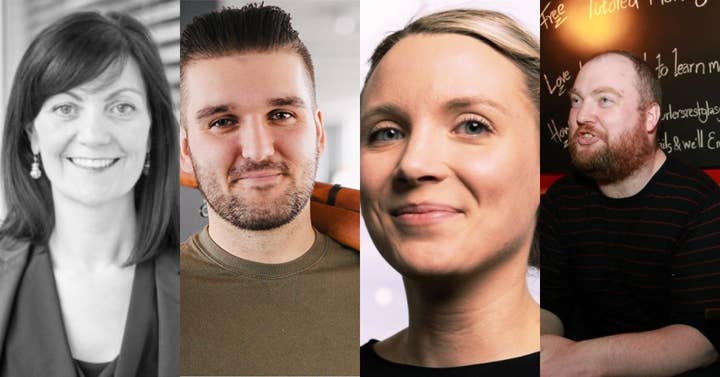The trials of remote working
At the Games Education Summit 2022, panellists from Media Molecule, Bulkhead and Falmouth University discuss pros and cons of flexible work options
During the pandemic, many industries (including the games industry) were forced to adopt remote working in order to stay afloat. Now, as the world slowly readopts physical spaces, the future of remote work is uncertain.
While there are benefits to working remotely, adopting it as a consistent practice has come with hurdles for some companies across the games industry. As part of the Games Education Summit 2022, industry guests discussed the evolution of remote working, and some of the pros and cons of keeping it indefinitely.
The panel was moderated by Amiqus business manager Liz Prince, and featured Media Molecule director of product Jess Gaskell, Bulkhead Interactive CEO Joe Brammer, and Brian Macdonald, senior lecturer at Falmouth University.
Prince started the conversation by asking how the pandemic changed what employers are looking for, and noted that a lot of studios have considered a flexible, hybrid option moving forward.
Macdonald noted that remote working is a good tool for retention, something that the industry is currently struggling with, but added that not everyone has the luxury of working remotely in a productive way.
"Everybody's situation is different," he said. "For example, I have the conditions to have a good work/life balance from home, but students and parents don't.
"People need the option to separate home and work life, and you need to understand the situations your colleagues are in and what they need"
Brian Macdonald, Falmouth University
"People need the option to separate home and work life, and you need to understand the situations your colleagues are in and what they need."
Gaskell said that remote work opened an option to a studio she may have never considered otherwise, and added that she's now in the process of working with Media Molecule on what companies and employees need from that style of work.
"I'm starting to look at what skills we need at the studio, and how to offer flexibility," she said. "That's been a challenge to work out, and we're still in that process."
Brammer said he prefers working remotely but doesn't think it's entirely flawless, and dislikes the idea that remote is a better option overall to working in a physical space.
"I hate it when people say remote is better, I prefer it personally, but some problems are still there," he added. "We have 100 people in our studio, everything was slower, there was more meetings, but that doesn't mean you shouldn't do it."
He also noted that pivoting to remote gave Bulkhead the same hiring capabilities as other companies that it is competing for talent for, which was a positive.

Gaskell added that remote working has made places actively think about actions and interactions that happen naturally in a physical space.
"We've gotten more intentional about things, because things learned via osmosis in person, taking lunches at a certain time with people, for example, doesn't happen remotely," she said.
Looking at the academic side, Macdonald also shared how remote and hybrid learning has benefitted students, and said that shifting to that gives them "asynchronous access to materials."
While that is a benefit, it also means that students are working remotely at different times of day, and it's impossible for lecturers and academic staff to be available at the convenience of everyone's needs. He added that "we need to set parameters of when conversations happen," with communication boundaries, such as setting a timeframe to reply to an email.
Brammer commented on how students transitioning from remote learning to remote positions in games can be rough, because a lot of soft skills are lost.
He also highlighted a general lack of specialisation in games-focused degrees, and said that students often come out with several skills in multiple areas, but no hard focus on one.
"The passion is there, but it would be better if students had the opportunity to focus on one skill, it would be much better," he explained.
"The passion is there, but it would be better if students had the opportunity to focus in on one skill"
Joe Brammer, Bulkhead
The panel discussed ways in which students can be better prepared to enter the games industry, and how jobs can reach a more diverse pool of candidates.
Remote working has allowed a wider range of graduates and applicants to secure roles, and as Macdonald added, this also applies to remote university courses.
"We've been doing online courses in game development and UX design that allow people from different backgrounds in," he explained. "The remote aspect gives the course a national audience, and it allows people with all kinds of circumstances to get in."
He added that these remote offerings may even reach people that might not have even considered game development at all.
Even when the hires are made, retention is something that studios need to have a handle on, and remote work has created more areas for communication to break down, leading to more departures.
Brammer said that company culture gets harder to manage as a studio gets bigger, and offered examples of efforts to nurture the culture at Bulkhead during the pandemic by understanding his team and what it needs.
"I didn't want to send a 22 year-old programmer some jam from Selfridges," he said. "Instead, I hired an esports pro to host an in-studio Overwatch tournament with an Xbox giveaway."
Gaskell also offered advice on how studios can look after employees after pivoting to a remote or hybrid environment.
"A lot of the support needed [at Media Molecule] has come from production, looking after teams, making sure communication is consistent across the studio," she said.
"That involves making sure meeting notes are being distributed, not overwhelming Slack chats and making sure information isn't buried, and putting a lot of time into what tools we have and using them effectively."

